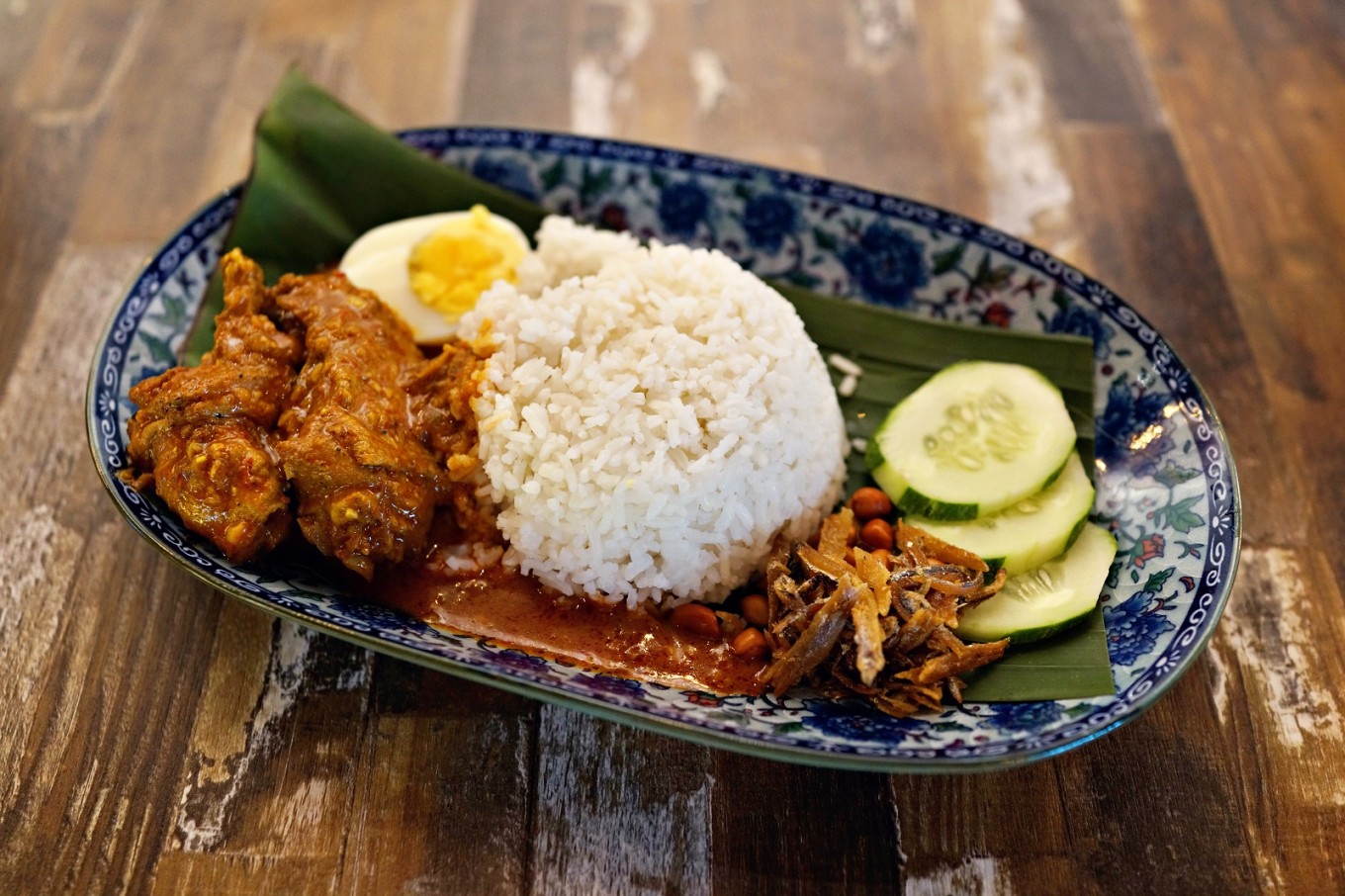Popular Reads
Top Results
Can't find what you're looking for?
View all search resultsPopular Reads
Top Results
Can't find what you're looking for?
View all search resultsIn defense of crispy 'rendang' comment on 'MasterChef UK'
The internet has been filled with criticism of the comments made by MasterChef UK judges on a nasi lemak dish made by one of its Season 14 contestants: “I like your rendang flavor, however, the chicken skin isn’t crispy, it can’t be eaten.”
Change text size
Gift Premium Articles
to Anyone
T
he internet has been filled with criticism since the MasterChef UK judges’ comments on a nasi lemak dish one of its Season 14 contestants had made: “I like your rendang flavor, however, the chicken skin isn’t crispy, it can’t be eaten.”
The challenge for that day was to cook a dish inspired by a personal or a family favorite in less than 90 minutes. The contestant who made the nasi lemak, Zaleha, was a British-Malaysian and chose a dish perfectly suited to the theme: nasi lemak served with spiced prawn sambal, crispy anchovies, omelet and chicken rendang curry – just typing this makes my mouth water. Zaleha had chosen to cook this dish since it was her daughters’ and her own childhood favorite. She also recounted the story of how her British husband still wanted to marry her, despite the amount of spices her mother used in the dish when he first met her family.
However, Zaleha was eliminated because of her “non-crispy” chicken rendang. Furious social media users from Malaysia, Indonesia and Singapore believe that chicken rendang should not be crispy. They are calling out the judges as ignorant and lacking sufficient knowledge of other cuisines.
Read also: 'Rendang has to be crispy,' MasterChef UK moment riles up Malaysians
Interestingly, instead of debating Zaleha’s presentation of her chicken rendang as a traditional Malaysian dish rather than an Indonesian dish, most social media users have insisted that traditional chicken rendang was not crispy and that it was wrong for a western man to judge Asian food. The long years of sparring between Indonesia and Malaysia over the origin of a variety of cultural heritage, such as rendang, batik and the “Rasa Sayange“ song seem to have been forgotten, and the two nations seemed to share the same feelings about the judges’ comment.
In response to the social media fury, one of the judges, John Torode, tried to divert the focus via his Twitter account, tweeting that maybe rendang was Indonesian. Perhaps being satirical, Torode also added “namaste” in the end, sparking even more mockery since the greeting isn’t commonly used in either Malaysia or Indonesia. The tweet was subsequently deleted, presumably to avoid further misunderstandings.
The criticism regarding ignorance of Indonesian cuisine might have some basis.
Last year, during my Erasmus+ exchange in the UK, I went for Christmas dinner at an Indian restaurant with my roommates. We all chose an Indian restaurant to celebrate the fact that I was the only Asian in our apartment, and because it also had vegan options for on of our roommates. While deciding what to order, everyone asked me to explain what each dish was. To be honest, I was not very familiar with Indian cuisine, as growing up I had tasted more Japanese and Chinese dishes than Indian. I told them that I was not familiar with all of it, so I only explained the ones I had tried, like the biryani or chicken tikka masala. Still, it was weird that they all assumed I would know everything on that menu.
Chinese, Indian and Japanese restaurants are easily found in Europe. Besides these three Asian cuisines, Middle Eastern food is also very popular. When other restaurants are closed on Sundays, we can see Turkish kebab shops open late every day until after midnight. Going out with families at the weekend for falafel and couscous is pretty common.
I did my exchange in Aberystwyth, a small town in Wales that had no Indonesian restaurants that I knew of; moreover, only four Indonesians – all students – lived in that city, so I doubt there were any.
Nina Hanafi, owner of the Djakarta-Bali restaurant in Paris who is also president of the Indonesian Diaspora Network, said that there were less than 10 Indonesian restaurants in France. This figure rises to around 2,600 restaurants in Europe, including the Netherlands where Indonesian restaurants are abundant.
Read also: Djakarta Bali: A love story once unrequited
When it comes to Southeast Asian cuisine, I would say the most popular would be Thai and Vietnamese. Who has not heard of pad Thai or pho? I assume that the many European tourists to Thailand and Vietnamese emigration following the Vietnam War could explain this.
These could be many reasons why many people are still ignorant of Indonesian cuisine. Despite the large population of Indonesians abroad, the number of Indonesian restaurants is low compared with restaurants of other Asian cuisines. According to Foreign Minister Retno Marsudi, 4.3 million Indonesians lived abroad in 2016. The Indonesian restaurants that exist today have not made themselves popular, and have not innovated so that their food is widely accepted by the western world.
Recently, the Tourism Ministry launched a partnership with prominent Indonesian restaurants worldwide to boost the country's gastro-diplomacy. According to Nina, gastro-diplomacy was widely used in the early 2000s in Thailand's “Global Thai” initiative, followed by other countries such as India, Malaysia, Taiwan and even North Korea.
"Encouraging the establishment of Indonesian restaurants is positive, but it has to be very carefully planned and managed in order to assure the restaurants’ sustainability," she advised.
Read also: Ten diaspora restaurants set to promote Indonesian tourism
I am not saying that Indonesians in the culinary industry are not innovative. Returning to Jakarta after four years abroad, I have seen many new dishes that did not exist before. I was so happy when I first tasted red velvet martabak with Oreos, and then my friends said, “Oh Nadira, that has been around for a long time! You should try pisang nugget with es kopi susu!”
However, netizen’s angry reactions to Zaleha’s elimination for her traditional dish seem to indicate their unwillingness to change. On her Instagram post Zaleha said she was gutted and would still continue to cook in the traditional way. While there is nothing wrong with preserving culture, this might not be sustainable for the restaurant business in Europe.
Living in France, I tried different types of French cheese and I still cannot enjoy goat’s cheese. Perhaps this is because I only tried it in the traditional manner, eating it with a slice of bread spread with salted butter. Maybe I would enjoy goat’s cheese more if it was served melted on top of ayam geprek. If a French chef would open a French restaurant targeting Indonesian customers, then he would not only serve stinky French cheeses atop a slice of bread. In the same way, McDonald’s in Indonesia serves fried chicken with rice, not just burgers and fries.
Winners of MasterChef will have the fame and fortune to open their own restaurants. If the contestants are not able to impress the judges, how will they be able to impress their diverse customers? Because of this, the MasterChef judges’ making stinging comments is nothing unusual. We all might remember Chef Juna’s cold behavior from MasterChef Indonesia’s first two seasons. Not only do the judges need to know about cooking, they also need to know about the culinary market. Gordon Ramsay, the best-known judge of MasterChef US, owns restaurants all over the world and produces a variety of TV shows on cooking and hospitality.
I have always been a fan of MasterChef. The series, which started in the UK in 1990, has been remade in many countries around the world, including the US and Indonesia. My favorite series was MasterChef Australia Season 8, where they had Nidhi, an Australian-Indian contestant who dreamed of presenting homemade Indian cuisine to the world. However, in sticking to her homey principles, Nidhi was eliminated because she could not keep up with the other contestants who were trying out different, contemporary techniques in preparing their dishes.
Zaleha should have also taken that into consideration. Her dish had a great presentation and many mouthwatering components, yet she was not able to make sure to pay attention to each and every detail. The judges in the elimination commented on the chicken being tough and not really flavorsome. Who would enjoy eating bland, white chicken in rendang? I would say that next time someone wants to win MasterChef, they’d better not leave their chicken “non-crispy”. (dev)
***
Nadira is passionate about cultures and exploring the world. She has just completed her International Relations undergraduate program at Turkey’s Bilkent University, and is now improving her French in the rainy north of France.
---------------
Interested in writing for thejakartapost.com? We are looking for information and opinions from experts in a variety of fields or others with appropriate writing skills. The content must be original on the following topics: lifestyle (beauty, fashion, food), entertainment, science & technology, health, parenting, social media, travel, and sports. Send your piece to community@jakpost.com. For more information click here.











